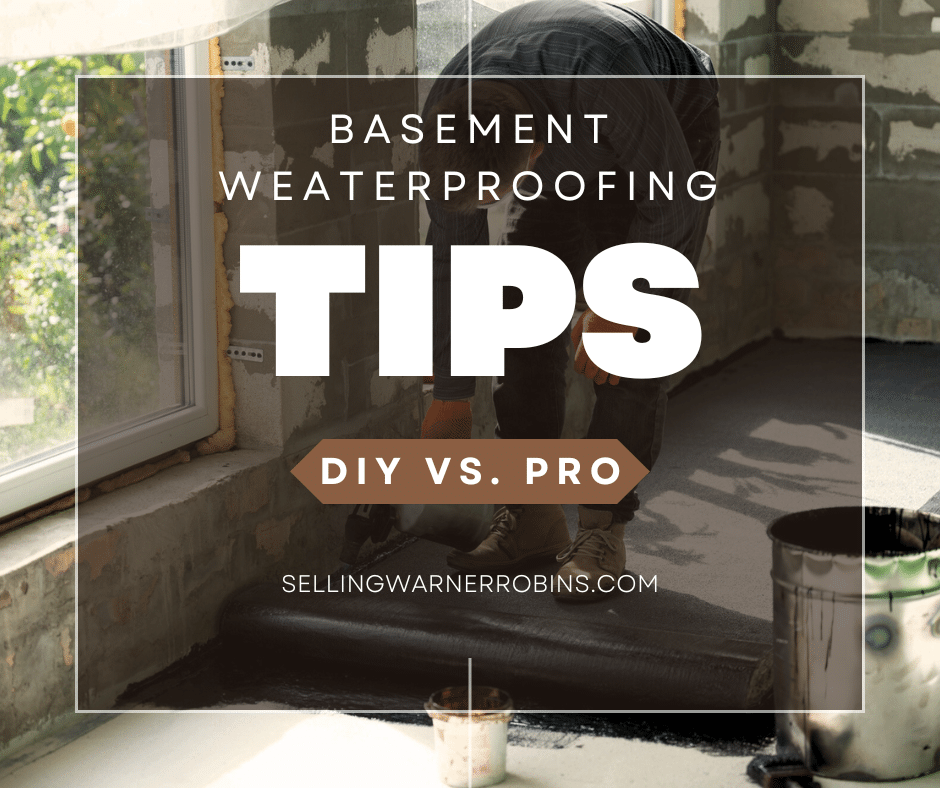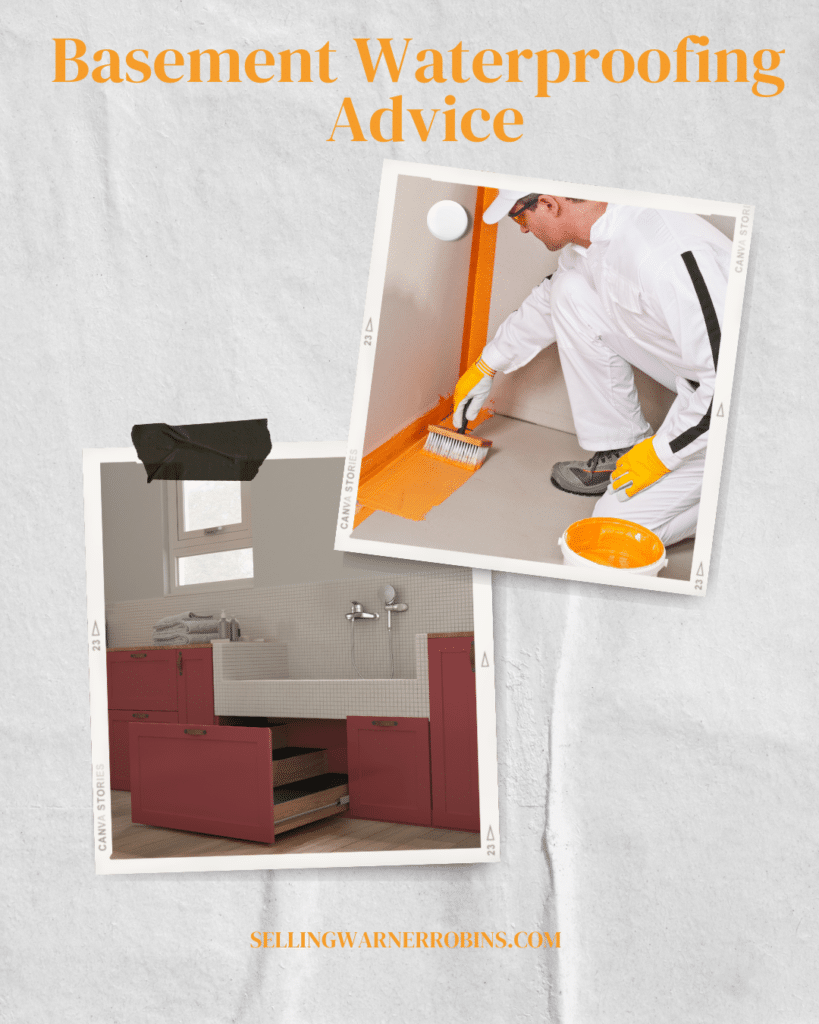Basement Waterproofing Tips
A lot of homeowners deal with water-related issues that destroy their houses. Dampness and excessive moisture can lead to musty basements and water-damaged crawl spaces. However, when you think about basement waterproofing, the first thing that may come to mind is the budget.
Many homeowners tend to opt for DIY basement waterproof options due to financial constraints, but seemingly minor basement problems often have a serious underlying cause that DIY solutions fail to address. Only professionals can identify the root cause of damage and provide permanent solutions to your water-related problems. In this article, we will explore some common DIY basement waterproofing mistakes and learn how proper waterproofing is often a better choice over DIY.

Significance of Basement Waterproofing
Basement waterproofing acts as a barrier, protecting your property against moisture problems. In the absence of waterproofing, water can enter your basement, lead to mold growth, and cause structural damage. As a homeowner, you can harness the following benefits by waterproofing your basement:
- You can enhance the lifespan of your property.
- You can safeguard your home’s structural integrity.
- Waterproofing prevents the conditions that promote the growth of mold, mildew, and other pests.
- By waterproofing your home, you can protect yourself from health problems such as allergies and respiratory problems caused by mold, mildew, and other contaminants.
- You can save money that you would otherwise spend on costly repairs resulting from moisture issues.
- A dry and waterproof basement improves your property’s worth and its aesthetic appeal.
DIY Basement Waterproofing
Opting for DIY solutions to waterproof your basement can be tempting, especially when dealing with smaller moisture problems that seem easy enough to fix. In many cases, homeowners may try waterproofing to avoid the expense of hiring a professional, and, in some cases, DIY methods might indeed provide a temporary fix. However, the reality is that most homeowners are not equipped to diagnose or address the root cause of moisture in their basements. What seems like a small issue could be the result of deeper structural problems, poor drainage, or ongoing water infiltration that requires a more thorough, professional solution.
While DIY waterproofing can work for surface-level issues, it typically falls short when it comes to long-term protection and complete moisture prevention. In the following section, we’ll highlight some of the most common mistakes homeowners make when trying to waterproof their basements on their own.
Common DIY Waterproofing Mistakes
Here are some common DIY waterproofing mistakes that homeowners make while attempting to DIY.
-
Relying Only on Paint for Waterproofing
One of the most common DIY methods for waterproofing is applying waterproof paint to basement walls. These paints are marketed as an easy solution to moisture problems and can, to some extent, create a moisture barrier on the surface.
However, while waterproof paints may reduce dampness in the short term, they don’t tackle the root cause of water entry and will not provide lasting protection. Over time, the paint can crack, peel, or bubble as the moisture continues to push against the surface. As a result, the basement can end up with more extensive damage, including mold growth and weakened walls.
Waterproofing paint should only be used as a supplementary measure—not as a sole solution. Without addressing the true cause of the moisture (e.g., leaking pipes, poor drainage, foundation cracks), the paint will be rendered ineffective and might need to be reapplied repeatedly.
-
Ignoring Runoff Locations
Another major mistake homeowners make is neglecting the exterior of their home when waterproofing the basement. Water runoff from the roof, sidewalks, or driveway can accumulate near the foundation and seep into the basement, particularly if the grade around the house is improperly sloped. Without a proper drainage system, water can easily pool and begin to infiltrate your basement.
Ensuring that gutters and downspouts are clear and working properly is a crucial part of waterproofing. If water collects near the foundation due to clogged gutters or improper downspout placement, it will eventually work its way through cracks in the foundation or walls. Professional waterproofers take the time to check your home’s exterior drainage and make adjustments (e.g., installing French drains or improving the slope of the land) to prevent water from pooling near your basement walls.
-
Applying Inadequate or Incorrect Sealants
Many DIYers mistakenly use cheap, one-size-fits-all sealants to try and block moisture from entering their basement. While some sealants may seem to work initially, they can be ineffective if the cracks or joints they are applied to are too large or if the product isn’t designed for the specific type of damage. For example, using an acrylic-based sealant on wide foundation cracks may not fully address the problem, leading to the re-emergence of water seepage.
It’s important to use high-quality, waterproof sealants that are specifically designed for basement foundation applications, and even then, you must ensure that the underlying structural issue is addressed before applying any sealant.
Drawbacks of DIY Basement Waterproofing
DIY waterproofing has a lot of drawbacks, some of which are listed below:
-
Temporary Solutions
Most DIY methods are designed as quick fixes, not permanent solutions. When you tackle waterproofing yourself, you are likely to misidentify or overlook the real cause of your basement’s moisture problems. For instance, you may cover up a leaking crack with sealant, but that doesn’t solve the larger issue of foundation movement or shifting soil. Similarly, applying a coat of waterproofing paint might hide the dampness for a while, but the moisture will likely reappear when the paint starts to wear off.
DIY solutions fail to address issues like improper drainage, foundation cracks, or mold problems, meaning the issue is likely to resurface, often in a worse form. These “band-aid” fixes can end up costing more in the long term because they require constant reapplication or repair, but they never resolve the root of the problem.
-
More Expensive Over Time
Many homeowners choose DIY waterproofing because they believe it will be cheaper than hiring professionals. However, in reality, DIY solutions often lead to more expensive repairs over time. First, you may need to repurchase materials and tools if your initial efforts don’t work. You might also need to hire a professional anyway after a DIY attempt fails, which could mean spending even more money in the long run.
Additionally, many DIYers purchase low-cost, ineffective materials that don’t hold up under the pressure of constant moisture. For instance, a cheap sump pump may fail when you need it most, or a low-quality sealant might crack after a few months. As a result, you may find yourself paying for repairs on top of the initial DIY expenses.
Beyond the financial aspect, DIY waterproofing requires a considerable investment of time and energy. If you’re not familiar with the methods and products, it could take you longer than expected to complete the job—and if the problem persists, you may have to redo the work multiple times, adding further frustration and cost.
-
No Warranty
Basement waterproofing can be a physically demanding and dangerous task. Handling heavy equipment, such as power tools, excavators, or large pumps, can result in serious injuries if you lack the proper training or safety equipment. For example, improper use of a jackhammer when digging up the floor or the foundation could cause structural damage or personal injury. Additionally, exposure to harmful chemicals used in waterproofing products, like mold inhibitors or concrete sealers, can cause health issues if not handled correctly.
Furthermore, DIY basement waterproofing lacks any kind of warranty or guarantee. If your waterproofing fails after a DIY job, you’ll be left to cover the costs of repairs without any recourse. On the other hand, professional waterproofing services typically come with a warranty, which means if the solution doesn’t work as expected, the company will return and make necessary adjustments at no additional cost.
-
-
Potential Structural Damage
-
Inexperienced DIYers can inadvertently cause more harm than good when trying to waterproof their basement. For instance, digging around the foundation walls to install your drainage system or sump pump can lead to soil disruption, foundation shifting, or even structural collapse if not done properly. Using heavy machinery and equipment without the necessary knowledge increases the risk of damaging your property.
Professional waterproofers, by contrast, know how to handle these tools and perform the necessary tasks safely and effectively. They also understand how to identify and avoid any structural issues that could arise during the process.
Basement Waterproofing Projects for DIYers
While professional assistance is necessary, you can manage small waterproofing-related tasks on your own:
-
Regular System Checkups:
Regular basement check-ups are an effective way to keep your basement secure and dry. Make sure your sump pump, dehumidifier, and drains are efficiently channeling water away from your property. Also, pay attention to annual water heater maintenance to prevent water leakage and plumbing issues.
-
Strategic Landscaping:
Most of the problems in your basement arise when the soil around your home is shifting or oversaturated. The best thing you can do is to regulate the soil saturation and water movement around your home. Maintain negative grading and plant non-invasive vegetation in the soil surrounding your home to accomplish this.
-
Gutter Maintenance:
Gutters and downspouts play an important role in defending your home, particularly your basement, against water damage. Clogged and misaligned gutters and downspouts can lead to moisture problems and flooding. Therefore, it is important to inspect your gutters at least twice a year or after heavy rain.
Professional Basement Waterproofing
Here are the pros and cons of professional foundation waterproofing solutions.
Benefits of Professional Waterproofing

Here are some benefits of hiring experts for basement waterproofing:
-
Quick Service
Professional companies provide their customers with the quickest possible waterproofing solution. Their expertise and access to the right tools and supplies allow them to develop and implement waterproofing solutions quickly. Additionally, professionals will get it done right the first time, so you will not have to deal with ongoing flooding or repair projects.
-
Cost-effective
Professional services might require higher upfront costs, but they help you save money in the long run. Moreover, in the United States, around 25% of all insurance claims made by homeowners are due to water damage. So, remember that waterproofing methods are your investment towards a well-maintained home. Furthermore, the professionals are trained to handle all sorts of waterproofing tasks efficiently. With their skills and expertise, they can get your home back to normal in no time.
-
Prevents Long-Term Health Hazards
Water damage can cause mold to grow within 24-48 hours. Continuous exposure to mold spores can pose serious health hazards. Inhaling mold-contaminated air can result in asthma, allergies, and other respiratory problems. Experts can help you get rid of the mold completely, thereby ensuring a healthier environment in your home.
-
Professional Waterproofing is Stress-Free
Handing over basement waterproofing to the experts gives you peace of mind that your basement is in safe hands. When it rains again, you do not have to worry about seepage or waking up to a flooded basement.
Drawbacks of Professional Waterproofing
However, there are some drawbacks of professional waterproofing as well:
-
Scheduling Challenges
When you are hiring professional services, you have to plan everything with the waterproofing experts. It might be a bit challenging as you have to adjust your timing according to their schedule.
-
Higher Upfront Cost
Professional waterproofing requires a high initial investment. The cost depends on various factors, such as labor costs, the size of your foundation, and the extent of damage. However, once the experts have completed their work, your basement should be dry for several years.
Just like DIY waterproofing, professional foundation waterproofing has many benefits and drawbacks. However, the pros outnumber the cons. Therefore, it is better to hire experts to waterproof your basement.
Factors to Consider While Choosing Between DIY and Professional Waterproofing
Here are some factors you must consider while choosing between DIY and professional waterproofing:
-
Extent of Damage
The first thing to assess while choosing between professional and DIY basement waterproofing is the severity of the problem. Minor issues like small cracks in basement walls and floors, occasional damp spots after heavy rainfall, and surface-level dampness may only require a simple DIY solution. However, if your basement constantly remains flooded or you notice cracks larger than ⅛ inches in the walls, you require professional assistance for your basement. Efflorescence or water stains on the walls also suggest the need for professional repair.
-
Cost Considerations
Most homeowners opt for DIY waterproofing to save money. Processes like caulking, sealant injections, and waterproof paints are relatively inexpensive. However, they only resolve minor issues and are temporary solutions.
Professional waterproofing is a long-term investment that pays off in the future. It addresses severe basement problems and their underlying causes, saving you from frequent and costly repairs.
-
Skills and Experience
Even DIY waterproofing requires a basic understanding of tools and materials. While the average homeowner can easily manage tasks like applying sealants or waterproof paints, such tasks become much more time-consuming without prior experience. Professional waterproofing experts possess the necessary skills, experience, and tools to identify hidden problems and provide long-lasting solutions.
-
Warranty
If you are looking for a waterproofing solution that offers longevity and warranty, you should opt for professional waterproofing. Professional waterproofing contractors usually guarantee that their solutions last for up to several years.
-
Time and Efforts
DIY waterproofing projects require a lot of time. You need to put in extra effort to research methods, purchase materials, and dedicate several days to the task. If the issues are complex, the amount of time and effort required to resolve them is often even more overwhelming. Professional waterproofing is fast and efficient. Therefore, if you are looking for a robust and effective waterproofing solution for your basement, call professionals for help.
Hire Professionals For Basement Waterproofing Now!
Excessive moisture and water leaks can wreak havoc on your basement. Fixing the damage on your own might lower the initial costs but worsen the existing problems as DIYers often fail to address the primary cause of damage. Ready to waterproof your basement? Consider hiring professional services to do the job! They help you save time and money.
About Anita Clark Realtor
Anita Clark has written 687 posts on this blog.
by Anita Clark Anita is a residential Real Estate Agent in Warner Robins Georgia, with Coldwell Banker Access Realty (478) 953-8595, aiding buyers and sellers with all their real estate questions on her Warner Robins blog.



